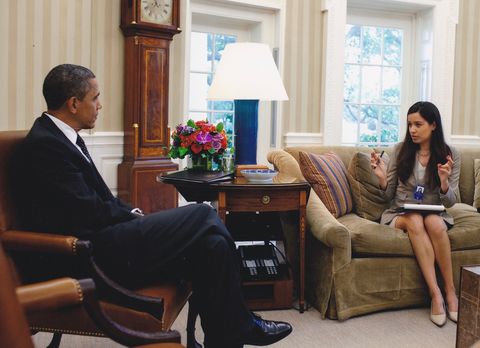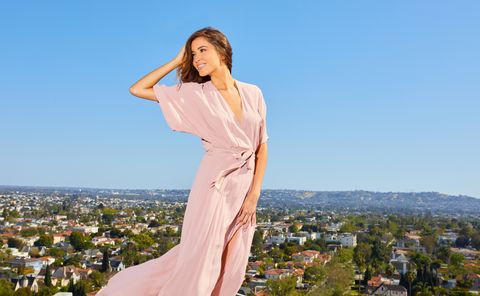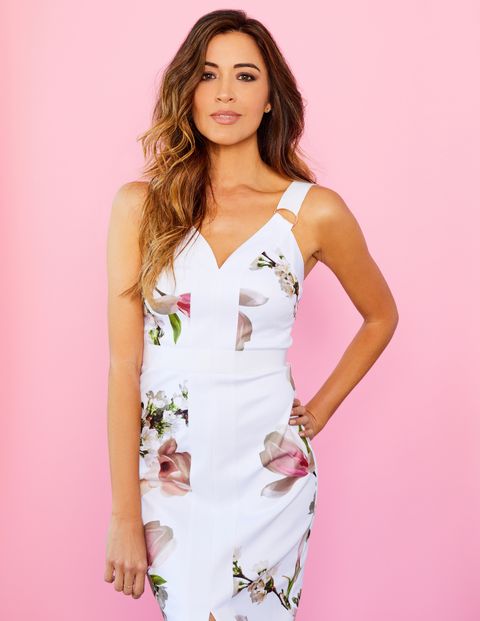
My breasts first started messing with me in junior high. I was at a friend’s slumber party and we were all dancing on the bed in our pajamas when, one by one, each girl ran to her backpack to grab a bra because she found the bouncing motion uncomfortable. Completely flat-chested at the time, I was left standing alone on the bed. It was the first time my breasts made me feel like an outsider, but it wouldn’t be the last.
In high school, as I waited impatiently for them to appear, I discovered the joy of hand-me-down padded bras. I’d swipe them from my mom’s underwear drawer, wearing two stacked on top of each other in an effort to achieve what I felt were appropriate-size lumps under my school uniform sweater.
My newfound feminine confidence was twisted into a supposed liability.
By college, I had assured myself that I was just a late bloomer, but the truth was, I was getting desperate. Where were they? I became a pro at swatting my boyfriend’s hands away from my Victoria’s Secret push-up bras, lest I be outed as the cleavage fraud that I was.
Then suddenly, in my early twenties, they arrived and all was forgiven. Temporarily working as a model after college, I found myself feeling significantly less insecure during photo shoots. I finally felt feminine. Like a real woman. Complete.
Of course that didn’t last long. Just as I hit my professional stride, attending graduate school at Harvard and then earning a job in the Obama White House, my breasts once again became a source of anxiety. Old modeling shots from back in the day resurfaced, caught fire in the media, and were used in a sexist attempt to try to discredit my intelligence. My newfound feminine confidence was twisted into a supposed liability.
I didn’t know at the time that the same breasts that had once evaded me and now had been weaponized against me would later threaten to kill me–or that within a few years, I would make the decision to remove my two healthy breasts entirely.
Everything changed for me in 2013 when I read a news report about BRCA1 and BRCA2, gene mutations that can be passed down to you by either of your parents and that significantly increase your risk of developing breast cancer. I realized that BRCA might be the reason for the devastating drumbeat of cancer that had echoed throughout my family for generations.
My great-grandmother died of breast cancer right after I was born. My grandmother died of breast cancer when I was 16. My mother fought breast cancer (and won) when I was in my twenties. My aunt was diagnosed with breast cancer last year.
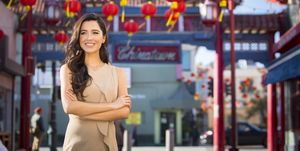
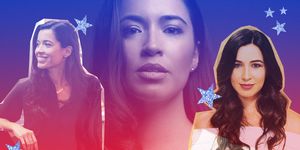
I asked my mom to take the test, and when it came back positive, I quietly left work early one day to have blood drawn at my gynecologist’s office. A few weeks later, a nurse delivered the news: I carried the BRCA2 gene mutation, bringing my lifetime risk of developing breast cancer to 85 percent.
After hearing the results, I swirled between numbness, sadness, and an unexpected feeling of matrilineal connectivity with the women in my family. We were linked by suffering related to breast cancer, but now I had an opportunity to break that chain. And I found that empowering.
That’s why one month from today, on October 10, I will be undergoing a preventive double mastectomy. As the date gets closer, I feel both terrified and relieved, but I know this is the right course of action for me. With one surgery, I will reduce my risk of developing breast cancer by at least 95 percent.
But I’ve also been feeling something else, something unexpected: I feel lucky. Like millions of Americans, I grew up in a home where access to health care was not a given. I was raised by a single mother who immigrated to the U.S. from Mexico just a few years before I was born, and at times during my childhood, we had to rely on public assistance such as Medicaid just to see a doctor.
Preventive tests were a luxury. When you can’t afford to take time off work, take the bus, and pay out of pocket, screening mammograms aren’t at the top of your to-do list. That’s why when my abuelita (grandmother) first found a lump in her breast, she didn’t tell anyone for almost a year. If she’d had health insurance at the time, her death from metastatic breast cancer might have been avoided.
Unfortunately, her experience is not unique. Far too many families go through what mine has, and it’s a reality that has to change.
When my grandmother first found a lump in her breast, she didn’t tell anyone for almost a year.
Today I am launching the Well Woman Coalition, an initiative whose mission is to empower women of color to have agency over their own health and healing through awareness, education, and advocacy. As a Latina from a community that struggles with barriers to resources and quality health care every single day, I learned firsthand that a lack of access to screening and treatment options can be the difference between life and death.
Sometimes you pick the issues you care the most about and sometimes they pick you. I never would have imagined that my own health struggles would lead me to run for U.S. Congress in 2017 and become a passionate advocate for women’s health. Increasing awareness in underserved communities is particularly important to me, given that women of color are more likely to be diagnosed with cancer in advanced stages due to these health disparities.
It is an inexcusable violation of our fundamental human rights for your level of physical suffering to be correlated with the color of your skin or the size of your pocketbook.
My relationship with my breasts has been complicated, but as we come to our final goodbye, they are leaving me with a message that is strikingly simple: We cannot afford to take our health for granted, and ultimately, we each have the innate capacity to direct our own health and healing.
Ironically, my breasts became the very vehicle through which I finally understood that they were never the cornerstone of my femininity–courage is. Breasts or no breasts, we are and have always been whole.
Alejandra Campoverdi is the founder of the Well Woman Coalition. She will be sharing her journey on Instagram at @acampoverdi.
Source: Read Full Article
